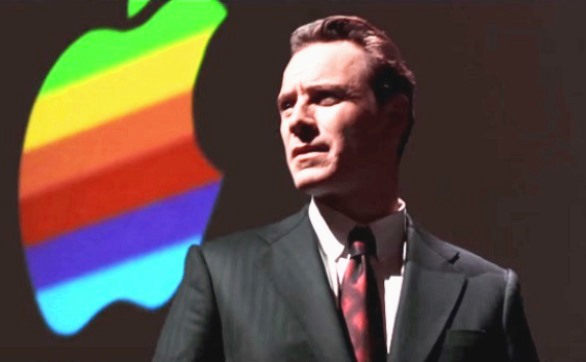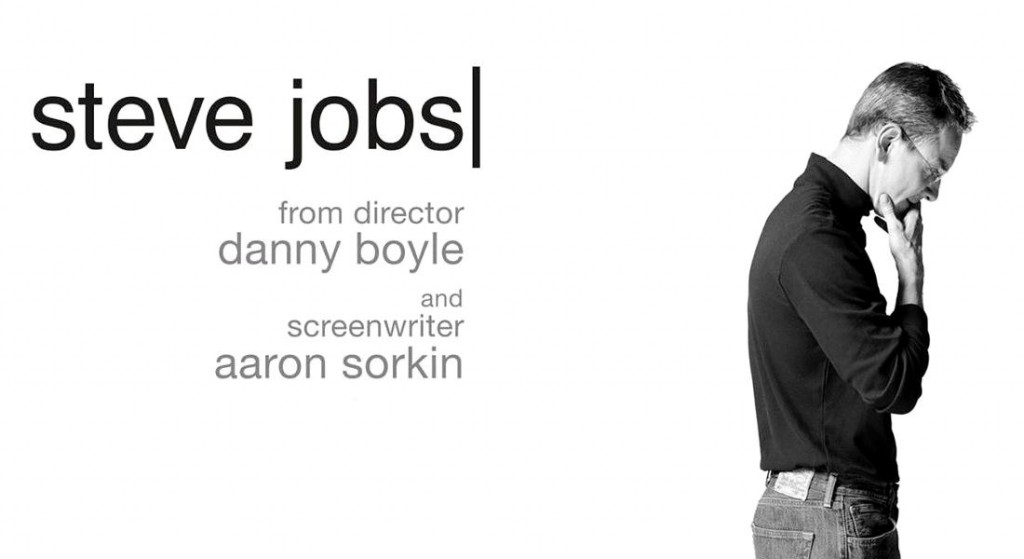
It’s the work of brilliant people behind the camera, but I’m shaking my head with what they left out of the film. Steve Jobs has a first-rate and disciplined performance by Michael Fassbender in the lead, as the bullheaded founder of Apple. Recent documentaries and journalistic findings reveal that Jobs was less than the technician than the idea man – he had a gift for taking credit for Steve Wozniak’s work (portrayed effectively here by Seth Rogen). I won’t dispute the notion, however, that Jobs changed the world. For the first twenty-five minutes, I thought how bold of this by director Danny Boyle (“127 Hours”) and writer Aaron Sorkin (“The Social Network”): It’s an extended unbroken scene in the hour before the 1984 launch of Macintosh computers. This is a free-flowing, naturalistic and quasi-documentary look at how Jobs was nasty with other people, especially with his daughter and estranged mother.
But the filmmakers have made a crucially horrible mistake.
Here he is, nasty with all the people who have chosen to surround themselves by him. Yet we never see his speeches during the launch presentations to allow us to observe how he won over crowds of people. We know his charisma was different during public interface, so why not let us see the contrast between his two personas?
We figure out soon enough the film is going to be told in three acts, the 1984 Macintosh launch, the 1988 Black Cube launch through his new company NeXT, and the 1998 iMac launch when he rejoined Apple – with a few brief cutaways in-between. The message, I believe, is to show us an emotionally detached person in 1984 and let us see the glimmer of small change he makes with his daughter, who he finally opens his heart to, in 1998.
Boyle is one of my favorite filmmakers, but another mistake by him is in how the 1984 Orwellian Apple commercial is discussed. If you were alive at the time or have somehow seen it since, it is perhaps the strangest and most impressive television commercial in history (the ad spot ran during the Super Bowl). However, if you’ve never seen it, you might have a problem with Boyle. His directing tantalizes you into thinking he’s going to show you the whole thing. But then he cuts around it. With odd angles.
Jobs had an unusual way of admitting he was wrong with not crediting Wozniak and not paying for his daughter’s college tuition when he was a billionaire. Jobs wanted his closest confidantes to intellectually argue reasons of why he was wrong, and he put up a fight until his others’ logic could win him over. Fassbender is such a fiercely intelligent and dominating presence as an actor, that there’s no doubt that when others are encountered with Jobs he is one of the most strong-willed and imposing of geniuses.
We have thematic territory that is uncommon for any film to contain. However, for a director, writer and a cast of actors with this much unparalleled talent you wish they would have provided more to their film so it wouldn’t have to require you to go home and find supplemental material elsewhere on the man. We get a shrewd personality showcase but when it comes to supplying a full scope of history it refuses to do that. But there are a number of great scenes.
With Kate Winslet as personal manager Joanna Hoffman, Michael Stuhlbarg as programmer Andy Hertzfeld and some very good scenes with Jeff Daniels as Apple CEO John Scully who butted heads with Jobs over the costs and advertising of their product.
122 Minutes. Rated R.
BIOPIC DRAMA / ADULT ORIENTATION / FOOD FOR THOUGHT
Film Cousins: “Pirates of Silicon Valley” (1999); “The Social Network” (2010); “Steve Jobs: The Lost Interview” (2011); “Jobs” (2013).





